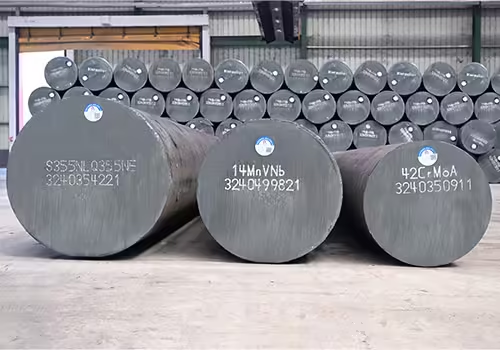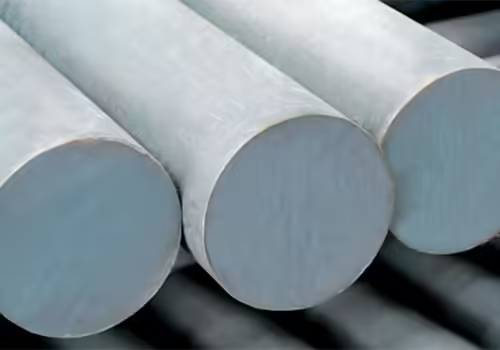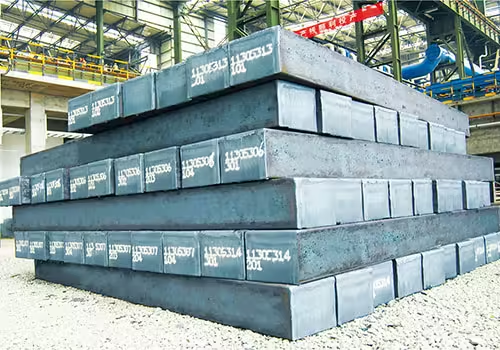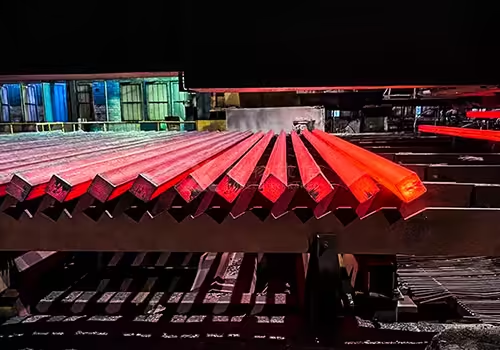
Why Billet Steel Is More Expensive but Worth Every Penny
Table of Contents
Introduction

When it comes to choosing the right type of steel for manufacturing, construction, or custom metalwork, professionals often face the challenge of balancing cost with quality. Among the various options, billet steel stands out for its unique characteristics and higher price point. But why is billet steel more expensive? And more importantly, is it really worth the added cost?
This article dives deep into the attributes, production process, advantages, and real-world applications of billet steel. By the end, you’ll understand why many industries willingly invest in this premium-grade material despite its higher price tag.
What Is Billet Steel and How Is It Made?
Billet steel refers to a semi-finished product formed from casting molten steel into rectangular or square shapes. These steel billets are then further processed into bars, rods, or other shapes through hot rolling or extrusion. The billet serves as the foundation for creating high-performance steel components.
The process begins with the melting of raw materials such as iron ore, coke, and limestone in a blast furnace. Once molten, the steel is cast into billets using a continuous casting machine. Unlike recycled steel or scrap-based steel products, billet steel comes from freshly refined material, which makes it more homogeneous and free from impurities.
Key Features of Billet Steel:
- High purity and consistency
- Excellent mechanical strength
- Ideal for forging and machining
- Long-lasting performance in extreme conditions
These features result from the controlled manufacturing process that eliminates contamination and ensures structural uniformity.
Why Is Billet Steel More Expensive Than Other Types?

There are multiple compelling reasons why this premium-grade material tends to carry a higher price tag compared to alternatives such as scrap-derived or rebar-grade steel. Understanding these cost drivers sheds light on its exceptional value proposition.
1. Use of Virgin Raw Materials
Unlike many common steel products made from recycled metals, this steel is produced using entirely fresh, high-grade raw inputs like iron ore, coke, and limestone. The absence of recycled content means fewer contaminants and greater uniformity in chemical composition. However, this also significantly raises the production costs from the very beginning of the supply chain.
2. Sophisticated Manufacturing Techniques
Its production involves advanced methods such as continuous casting, requiring specialized machinery and experienced technicians. Maintaining strict temperature control and precise metallurgical conditions ensures a high-quality result but also contributes to higher operational expenses.
3. Enhanced Mechanical Performance
This material boasts superior mechanical attributes—including impressive tensile strength, hardness, and ductility. These properties make it ideal for high-demand sectors such as aerospace engineering, heavy-duty automotive components, and industrial machinery, where strength and reliability are paramount.
4. Extended Service Life
Products made from this refined steel generally offer a longer lifespan. Its superior structure resists fatigue, deformation, and failure, making it a more durable choice. In the long run, this means fewer replacements, less downtime, and lower lifecycle costs.
5. Controlled Production and Limited Supply
Due to the high standards and controlled processes required during manufacturing, output levels are typically lower than those of mass-produced, lower-grade alternatives. This reduced availability—combined with elevated quality—naturally drives up market value.
Benefits of Choosing Billet Steel for Your Projects

Despite the higher initial expense, engineers and manufacturers consistently turn to this top-tier material for applications where performance, safety, and longevity cannot be compromised. The advantages are numerous and tangible.
Exceptional Strength and Load Capacity
Thanks to its refined composition, this steel variant offers significantly greater tensile strength compared to conventional grades. It performs exceptionally well under pressure, making it ideal for infrastructure, load-bearing components, and other demanding uses.
Reliable and Consistent Quality
One of its most valued features is consistency. The tightly controlled production process ensures that every batch offers uniform structural integrity and predictable mechanical behavior—critical for precision engineering.
Superior Machinability and Design Flexibility
Its homogeneity makes it easier to machine with accuracy. Whether you’re forging, milling, or forming intricate shapes, the material maintains stability and strength throughout the process, enabling innovative and complex designs.
Strong Resistance to Fatigue and Environmental Damage
This dense and pure alloy structure provides exceptional resistance to stress fatigue, corrosion, and abrasive conditions. As a result, components retain their structural integrity over time, even in extreme environments such as offshore, industrial, or high-temperature applications.
A Smart Long-Term Investment
Though the upfront cost is steeper, choosing this higher-grade option translates to lower maintenance requirements, fewer failures, and enhanced operational safety. For projects where performance cannot be compromised, the reliability it offers makes it a worthwhile and forward-thinking investment.
Comparison Table: Billet Steel vs. Other Steel Types
| Property | Billet Steel | Recycled Steel | Rebar Steel |
|---|---|---|---|
| Source Material | Virgin materials | Scrap/recycled metal | Scrap metal |
| Purity | High | Moderate to low | Low |
| Tensile Strength | Very high | Moderate | Moderate |
| Durability | Long-lasting | Moderate | Low to moderate |
| Production Cost | High | Low | Low |
| Machinability | Excellent | Average | Poor |
| Application Flexibility | High | Moderate | Limited |
| Resistance to Corrosion | Excellent | Moderate | Poor |
Real-World Applications of Billet Steel

In a wide range of industries where precision, durability, and safety are paramount, this high-performance steel variety proves indispensable. Thanks to its refined properties and structural reliability, it has become a material of choice across sectors that demand nothing less than excellence.
Automotive Industry
Within the world of automobiles, this refined steel plays a crucial role in the production of essential engine and drivetrain components. Items such as crankshafts, camshafts, connecting rods, and transmission gears are regularly crafted from this material because they must endure extreme levels of mechanical stress, elevated temperatures, and long-term fatigue. Using a cleaner, purer metal ensures superior performance and resistance to wear, which in turn enhances vehicle longevity and driving reliability.
Aerospace Engineering
Aircraft manufacturers operate under stringent requirements where failure is simply not an option. That’s why high-strength alloys like this one are favored for constructing critical parts such as landing gear assemblies, engine mounts, wing supports, and structural braces. Its impressive strength-to-weight ratio allows engineers to maintain structural integrity while keeping overall mass to a minimum—an essential factor in flight performance and fuel efficiency. Furthermore, its consistent quality ensures reliability even under the extreme pressures and temperature fluctuations encountered during flight.
Construction and Infrastructure Development
In the construction industry, structural soundness and load-bearing capacity are foundational priorities. This steel variety is commonly used in high-stress applications like support columns, bridge frameworks, foundation reinforcements, and high-rise skeletal structures. Its resistance to deformation, coupled with excellent mechanical uniformity, makes it a dependable solution for long-term infrastructure investments. Engineers often choose this material when designing elements that must withstand the weight of multiple stories or variable environmental loads over decades.
Tool and Die Manufacturing
Precision tooling is another area where the benefits of this material shine. Molds, dies, cutting tools, and machining components require not just hardness but also a high degree of dimensional stability. Because this steel type offers excellent machinability along with structural integrity, it becomes ideal for producing tools that must hold tight tolerances through prolonged use. Its uniform grain structure minimizes tool warping, thereby enhancing productivity and reducing the need for frequent recalibration or replacement.
Oil, Gas, and Petrochemical Equipment
Operating under some of the harshest conditions imaginable, the oil and gas sector demands materials that can perform flawlessly in high-pressure, high-temperature, and chemically aggressive environments. Components like drill bits, pipeline valves, downhole tools, and offshore rig hardware often rely on this metallurgically superior steel. Its inherent strength and resistance to corrosion help minimize the risks of operational failure, which is vital in an industry where downtime can lead to enormous financial and environmental consequences.
Conclusion
While the upfront cost of billet steel is undeniably higher, the long-term value it offers more than compensates for the initial investment. With its superior mechanical properties, resistance to wear, and versatility across industries, billet steel proves to be a wise choice for critical applications.
Investing in billet steel is not just about spending more—it’s about ensuring quality, safety, and durability for years to come. For projects where failure is not an option, choosing billet steel is the smart and reliable decision.
FAQ
What makes billet steel better than recycled steel?
Billet steel is produced from virgin materials, resulting in higher purity and more consistent mechanical properties than recycled steel.
Is billet steel suitable for outdoor use?
Yes, its resistance to corrosion and environmental stress makes it ideal for outdoor and marine applications.
Can billet steel be welded?
Absolutely. It can be welded using standard welding techniques, though preheating and post-weld treatments may be necessary for thicker sections.
Is billet steel eco-friendly despite being more expensive?
Yes, although it uses virgin materials, its long life and reduced need for replacement contribute to less waste over time.
What industries benefit most from billet steel?
Automotive, aerospace, construction, tooling, and energy sectors benefit the most due to the material’s reliability and strength.






